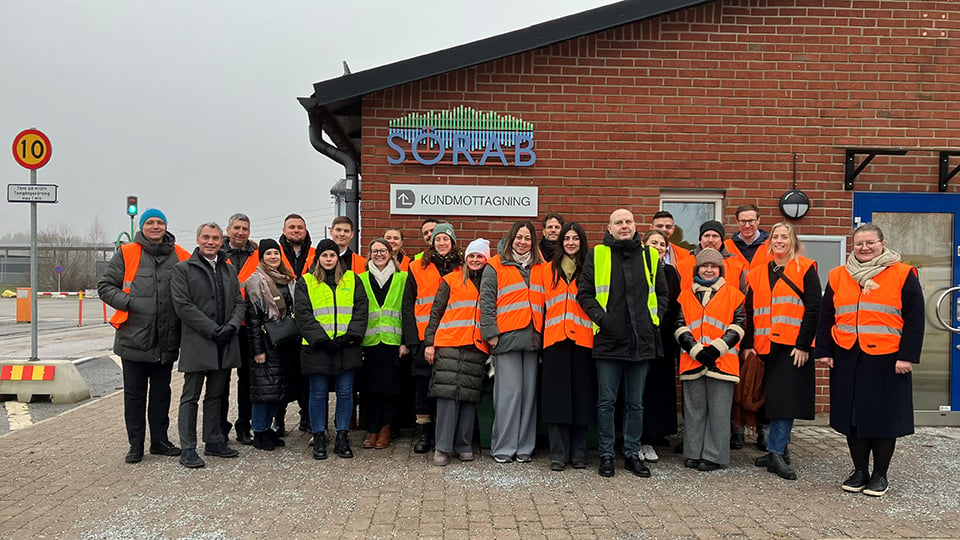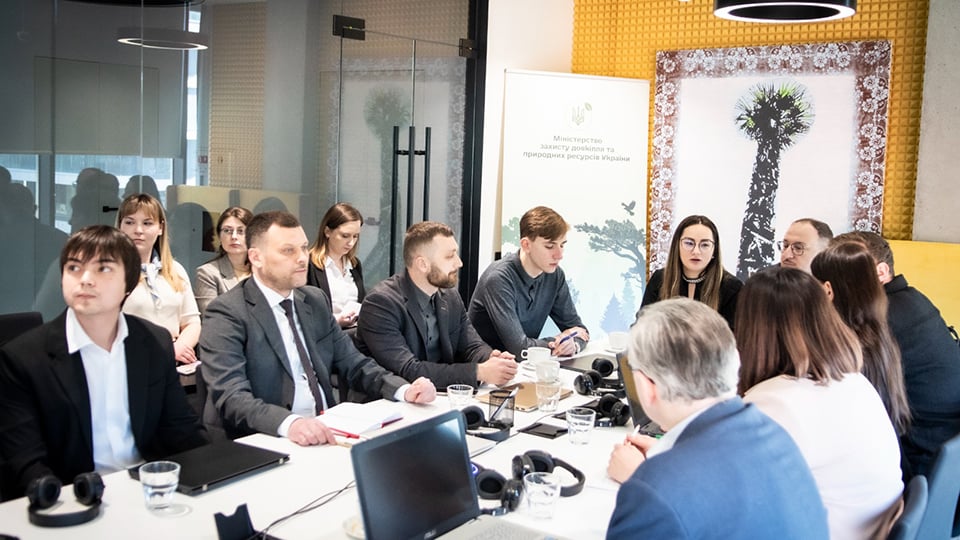
Ukraine – institutional cooperation on EU accession and waste management
The Swedish EPA cooperates with the Ministry of Economy, Environment and Agriculture (MoEPNR) on EU accession and waste management. The project started in 2024 and will run until 2027.
The project “Institutional cooperation on EU accession in the environment and waste sector in Ukraine” supports MoEPNR to improve the fulfillment of EU Chapter 27 – the environment and climate Chapter of the EU acquis – and fulfillment of the Minamata and Stockholm conventions on mercury and persistent organic pollutants (POPs).
The project has a two-fold approach to achieving its objectives. First, the project will support MoEPNR in its capacity to manage and prepare the EU accession process in Chapter 27. Second, the project will strengthen the capacity of the ministry to implement the waste legislation in line with EU requirements through policy- and decision-making and enhance its communication with waste stakeholders.
The project has three outcome areas:
- EU accession preparedness of MoEPNR strengthened with governance and management arrangements for EU accession in place (including mandate, planning, financing, policy, legislation).
- MoEPNR has improved waste management decision-making, in line with the Waste framework directive, the Landfill directive, and the Minamata and Stockholm conventions.
- Improved preparedness of municipalities, regions, and waste entrepreneurs for implementation of Ukraine’s national waste management plan.
Chapter 27: The environment and climate chapter of the EU acquis
The EU accession negotiations are divided into 35 chapters corresponding with the EU acquis. Chapter 27, covering the environment and climate, is one of the most demanding to fulfill in the accession process in terms of the required funds, institutional capacities, and the need for profound changes in the habits of people and industries. At the same time, investments are expected to generate substantial benefits in the long run, including environmental sustainability, human health, and economic growth.
The waste sector, which is part of Chapter 27, has a significant impact on the environment and human health, causing pollution, greenhouse gas emissions, and losses of materials. EU waste management policies aim to reduce these negative impacts, and to improve resource efficiency. The EU approach is based on the “waste hierarchy” principle, requiring member states to take specific measures to prioritize prevention, reuse and recycling above landfilling and incineration.
EU-accession in the Environmental Field
Ukraine was granted EU candidate status in June 2022 and is on the path towards alignment with the EU acquis and accession negotiations. The Swedish EPA cooperates with MoEPNR to strengthen their EU accession preparedness within Chapter 27.
The support is based on the Swedish EPA’s experiences from other candidate countries and focuses on strengthening essential governance and management structures within the ministry that handles the EU accession process on Chapter 27.
The cooperation aims to increase the ministry’s knowledge on EU accession requirements in Chapter 27, with an in-depth focus on the waste sector, strengthen the systematic approach to the fulfillment of requirements in the EU-accession process through supporting GAP-assessments of Chapter 27, put methodologies and tools in place (for the screening and the negotiation process), establish EU accession structures (for example procedures, roles and responsibilities), and increase capacity to lead investment processes.
The methodology for development of Directive Specific Implementation Plans (DSIPs) is a key component of this work. DSIPs are implementation plans for a transitional period for a few specific directives and/or regulations after EU membership that need to be requested and negotiated with the Commission. The Swedish EPA will support the drafting of such plans. Support will also be provided for increased internal and external communication in Chapter 27.
The cooperation is carried out in close collaboration with the EU-department of MoEPNR and partners such as Austria, Germany and the EU.
Waste Management
The Swedish EPA cooperates with MoEPNR to improve waste management decision-making and policymaking at the ministry – in line with the EU Waste framework directive, the Landfill directive, and the Minamata and Stockholm conventions.
The project aims to increase the institutional capacity of the ministry to develop policies and decision-making in the demolition waste sector, the hazardous waste sector, and with regards to landfills. Capacity development includes, for example, addressing roles and mandates, structures, gaps, and analysis of waste quantities. The project will also support increased institutional capacity on gender equality implications and anti-corruption measures. A key component of the support includes the development of Directive Specific Implementation Plans (DSIPs) for the Waste Framework Directive and the Landfill Directive.
Further, the Swedish EPA cooperates with the ministry to improve the preparedness of municipalities, regions, and waste entrepreneurs for implementation of Ukraine’s national waste management plan. The project aims to increase the capacity of the ministry for communication and outreach – for example by providing revised or updated guidance materials and trainings.
Work is carried out in close cooperation with the Waste Department of MoEPNR and partners such as SALAR International, Avfall Sverige, Austria and EU.
Key directives and conventions
The Waste framework directive (2008/98/EG) sets basic concepts and definitions related to waste management. It requires that waste is managed without endangering human health or harming the environment. The directive includes provisions for the preparation of waste management plans in accordance with the five-level waste hierarchy and programs for the prevention of waste generation.
The Landfill directive (1999/31/EC) includes provisions for the preparation of a national strategy for reducing the amount of household waste that decomposes under the influence of microorganisms (biodegradable) which are buried in landfills.
The Industrial emissions directive (2010/75/EU) regarding integrated pollution prevention and control aims to reduce the impact of industries on human health and the environment. This is achieved, among other things, through an integrated permit assessment based on the best available technique (BAT) for industrial plants.
The Minamata convention aims to protect human health and the environment from mercury. The convention regulates the full life cycle of mercury, from extraction, trade and usage to waste management and pollution.
The Stockholm convention aims to protect human health and the environment from the effects of persistent organic pollutants, POPs. POPs are toxic, chemical substances that have the potential to accumulate in unhealthy quantities in humans and animals. Examples include substances in certain pesticides and industrial chemicals.
Activity highlights

In January 2025, the Swedish EPA hosted ten representatives from MoEPNR to plan the continued cooperation, talk about issues of environment and waste, and visit Swedish waste facilities to see how they operate in practice. Participants engaged in discussions on the ministry’s needs as well as what expertise the Swedish EPA can provide.
The Swedish EPA and MoEPNR was accompanied by the Swedish Chemicals Agency, Salar International, Swedish Waste Management and Sida, who also support Ukraine in the fields of waste and chemicals.
The visit resulted in a clear plan and concrete actions for the continued cooperation. This was also the first physical meeting since the cooperation agreement was signed in September 2024. As such, it provided an opportunity to build relationships and for the Swedish EPA to gain a better understanding of the current Ukrainian context.

An important step in the process towards EU accession is a so-called screening meeting with the European Commission, where the country's legislation and EU regulations are reviewed. Ukraine held its screening meeting for Chapter 27 in June 2025.
In May 2025, a general rehearsal was held with MoEPNR in Kyiv in preparation for this screening. It was a simulated meeting where Ukraine had the opportunity to refine its presentations and prepare for the meeting in June. The rehearsal was conducted by the Swedish EPA together with authorities from Austria and Germany.
The Swedish EPA participated with experts in various fields, ranging from sludge management, water issues, and land monitoring to nature restoration, wild birds, habitats, and the sharing of genetic resources, as well as the CITES regulation.
The Swedish EPA has previously provided similar support to countries in the Western Balkans ahead of their screening meetings.
Financing
The project is financed by Sida.
More information
Ministry of Economy, Environment and Agriculture (mepr.gov.ua)
Contact: Annakarin Lindberg, Project manager annakarin.lindberg@naturvardsverket.se